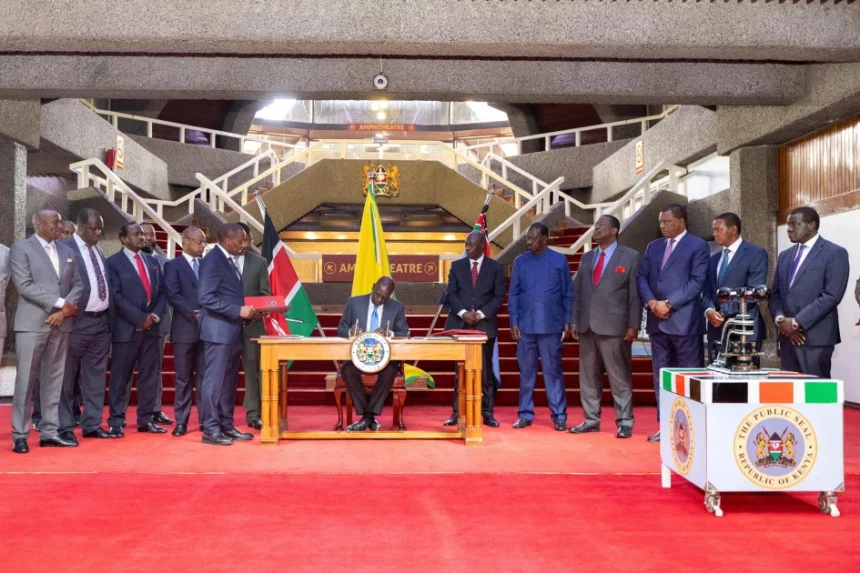One of the thorny issues that dominated protests in Kenya has been laid to rest after the Independent Electoral and Boundaries Commission (IEBC) (Amendment) Bill, 2024 was signed into law.
Protesters in recent anti-tax demonstrations demanded the reconstitution of the IEBC to pave way for the hiring of new commissioners and recall of incompetent legislators.
Heeding the calls, President William Ruto on Tuesday assented to the IEBC (Amendment) Bill which paves the way for establishment of the selection panel for the appointment of new IEBC commissioners.
President Ruto said new commissioners should uphold the electoral body’s mandate of ensuring elections are managed transparently and administered in an impartial, efficient, neutral, accurate and accountable manner.
“I concur with leaders who have said there must be professionalism and integrity as part of the cardinal principles of the men and women who will be charged with overseeing our elections,” he said.
The IEBC bill was the first to be processed by Parliament based on the recommendations of the National Dialogue Committee (NADCO) report tabled by a 10-member delegation after a disputed 2022 presidential election results which saw a section of the IEBC commissioners disown Ruto’s election victory.
Fresh Regulations
The IEBC Act now requires any individual seeking to be an IEBC commissioner to possess proven knowledge and at least ten years’ of experience.
Aspiring commissioners will also require experience in Information and Communication Technology or accounting to bolster the Commission’s efficiency and effectiveness.
Under the new law, members of the selection panel have been increased from seven to nine to accommodate a cast representation of stakeholders and interest groups.
The selection panel will include 2 persons nominated by the Parliamentary Service Commission (PSC); one representing the majority party and another from the minority party.
It will also have three persons nominated by the Political Parties Liason Committee; one not from a parliamentary party.
It will also include one person nominated by the Law Society of Kenya (LSK) and one nominated by the Institute of Certified Public Accountants of Kenya.
Two other persons will be nominated by the Inter-Religious Council of Kenya.
The Commission will also, after every general election, be required to review its operations and make the necessary changes required to make its operations more efficient, effective, transparent and accountable.
Secretary to the Commission shall also hold office for a term of three years and may be eligible for re-appointment for one further term of three years.
“The review shall be completed within one year after every general election and the Commission shall publish the report in the Gazette and submit the report to Parliament,” reads the law in part.
Opposition leader Raila Odinga Odinga said the Act comes at a time when Kenya is at a crossroads as a result of deadly nationwide protests against taxation and President Ruto’s leadership.
“Most of the issues being raised by the youth today are contained in the NADCO report. If it is implemented fully, it will address all the issues Kenyan youth have raised,” said the former Prime Minister.
He called for a wider engagement beyond committees such as NADCO for Kenyans to “vomit all that is in their chests” to the government.
What next?
The new law will now see President Ruto appointing members of the selection panel which will select its chairperson from its members in its first sitting.
New applications will then be invited within seven days of the panel’s appointment and shortlisting will later follow for interviews.
“The chairperson of the Commission shall be a person who is qualified to hold the office of judge of the Supreme Court under the Constitution,” reads the law.
Within 90 days the panel will be needed to forward two names for the chairperson position and 9 others for the commissioner positions and thereafter the panel will stand dissolved.
The names will be forwarded to Ruto who will select one chairperson and six commissioners.
After selection, he will forward the names to the National Assembly for approval and if a greenlight is given the names will be returned to Ruto for appointment.
The Act might now allow for the recall of MPs who have been put under the public’s microscope on competence.



